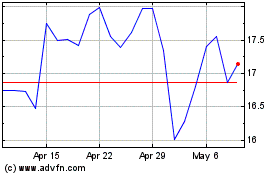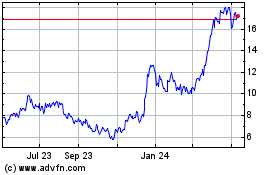How Century Aluminum Won a Lonely Fight for Tariffs
March 22 2018 - 8:29AM
Dow Jones News
By Bob Tita
In an industry hollowed out by decades of foreign competition
and plant closings, a little-known aluminum maker became the
leading advocate for tariffs that most of its competitors didn't
want.
Century Aluminum Co. emerged as the de facto face of the U.S.
aluminum industry when President Donald Trump invited Chief
Executive Michael Bless to the White House earlier this month to
discuss his tariff plans, rather than leaders of larger firms with
plants in the U.S.
The president's 10% tariff on imported aluminum, which takes
effect Friday, validated the years that Century executives spent
lobbying for trade protections despite opposition from larger rival
Alcoa Corp. and other companies that import some aluminum from
Canada, the Middle East and Asia.
"Our industry has been devastated for years, and nobody was
talking about it," said Jesse Gary, Chicago-based vice president
and general counsel of Century. "We had to stand up for it."
Century cobbled together support for the tariffs from the United
Steelworkers union and small, private companies that make aluminum
components. Century executives founded a trade group, the China
Trade Task Force, to argue that rising aluminum production in Asia
and the Middle East was to blame for falling employment at aluminum
plants in the U.S.
Mr. Trump has said protecting U.S. jobs is a main goal of the
tariffs, along with ensuring a domestic supply of the metal for
defense and national security infrastructure.
Century and Alcoa are the only companies that operate aluminum
smelters in the U.S. Century, which was spun off from Swiss mining
and commodities conglomerate Glencore PLC in the mid-1990s,
generated about two-thirds of its $1.5 billion in sales last year
from its U.S. operations. The company also makes aluminum in
Iceland.
Mr. Gary said Century executives decided to lobby for tariffs in
2015 as plunging oil prices touched off a broader commodity bust.
The price of aluminum dropped 40% that year, and Century idled
nearly all of the lines at its three U.S. smelters.
Century and other companies blamed the drop on a glut of
aluminum production in China that they said was flooding the world
with cheap sheet, plate and extruded shapes. Century said it needed
tariffs to keep that government-backed production from undercutting
prices in the U.S. or entering the U.S. duty-free through other
countries.
"They became the most visible advocate for the tariff," said
Lloyd O'Carroll, an industry analyst in Virginia. "Even though it's
a small company, it was quite vociferous."
Alcoa, which made just about 14% of the aluminum it produced
globally last year in the U.S., opposed the blanket tariff. The
Pittsburgh-based company has been critical of companies in China
overproducing aluminum, but supports reining them in through
negotiated reductions instead of the Trump administration's
strategy of a sweeping tariff on all the world's aluminum.
The industry's trade group, the Aluminum Association, also is
opposed to the tariff. Many of the association's members make
finished goods like parts for cars and airplanes with imported
aluminum that will be subject to tariffs. They say there isn't
enough production capacity in the U.S. to meet aluminum demand
without imports. There are already U.S. tariffs on specific
aluminum products from China, such as foil.
U.S. manufacturers and aluminum processors consumed 11 million
metric tons of aluminum last year, while Century and Alcoa produced
just 748,000 metric tons of raw aluminum here. Imports made up more
than half of the difference, alongside aluminum from recycled
scrap.
A spokesman said Alcoa is pleased that imports from Canada and
Mexico will be exempted from the tariffs and wants additional
exemptions granted for other countries that trade aluminum fairly.
Alcoa and the Aluminum Association say the tariff will discourage
other countries from working with the U.S. to discourage
overproduction in China.
"You'll end up penalizing countries that agree with us," said
Aluminum Association spokesman Matt Meenan.
Rising electricity costs in the U.S. and the construction of
lower-cost smelters abroad contributed to the closure of nearly 20
U.S. smelters since 2000. Most have been demolished, including
Century's smelter in Ravenswood, W.Va.
Century's Mr. Gary predicted the tariff and rising demand could
lead companies to restart up to 1 million metric tons of annual
U.S. production capacity. He said electricity costs are no longer
the liability they once were. An abundance of cheap natural gas
used to generate electricity has brought down power costs in the
U.S. Electricity accounts for almost half the cost of producing
aluminum in a smelter.
The new owner of an idle aluminum smelter in southeast Missouri
plans to restart about 60% of the plant's production capacity this
year after securing an electricity contract. The plant has been
closed for two years.
After Mr. Trump committed to the tariff this month, Century said
it would double both its production and workforce at a Kentucky
smelter. Alcoa was already planning to partially restart a smelter
in southern Indiana this year before the tariffs were
announced.
"You're seeing production come back on," said Mr. Gary. "We
think the right remedy was reached."
(END) Dow Jones Newswires
March 22, 2018 08:14 ET (12:14 GMT)
Copyright (c) 2018 Dow Jones & Company, Inc.
Century Aluminum (NASDAQ:CENX)
Historical Stock Chart
From Mar 2024 to Apr 2024

Century Aluminum (NASDAQ:CENX)
Historical Stock Chart
From Apr 2023 to Apr 2024
